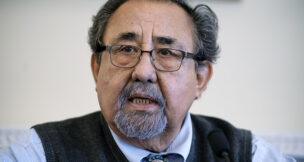Ducey signs protection measures for police
Nathan Brown Arizona Capitol Times//May 13, 2021//
Gov. Doug Ducey has signed three pro-police bills that, supporters said, would help protect fairness in disciplinary actions, but opponents worry they will stack the deck too much in favor of law enforcement.
On May 7, Ducey signed bills to require civilian review board members to have some police training and to give officers notice before a prosecutor adds them to the so-called “Brady list” of police officers who have been caught doing something dishonest. And on May 5, he signed House Bill 2567, which requires two-thirds of the voting membership of any governmental committee, board or entity investigating police officer misconduct to be Arizona Peace Officer Standards and Training-certified law enforcement officers of the rank and from the same department as the officer being investigated.
All of these measures passed on party-line votes, in the House in late February or early March and the Senate at the end of April. The Republican supporters of HB2462, which adds the training requirement for civilian review board members, said it would ensure that people who have power over police discipline understand what police go through when making an arrest.
“Police civilian review boards are not community public relations programs,” said Rep. John Kavanagh, R-Fountain Hills. “Police civilian review boards are charged with judging police officers who have been charged with misconduct, and their findings can end a police career.”
Sean Mattson, vice president of the Arizona Fraternal Order of Police, said some of the opposition stemmed from misunderstandings about the amount of or expense of getting the training the bill requires. Civilian police academies are offered for free, he said. Mattson said boards usually bring in experts when they make rulings, and that the bill “will arm them with the knowledge on the front end.”
“I don’t want any civilian to sit on a judgment board and think that ‘Dirty Harry’ policing is appropriate, and I also want them to be well-educated enough to know what is permitted under current law and existing statutes,” Mattson said.
Democrats said the training requirements would make it harder for members of the public to get involved and would result in civilian review board members who are biased in favor of police.
“We need to rebuild the trust between the community and law enforcement,” Rep. Diego Rodrigeuz, D-Phoenix, said on the House floor. “People are not protesting law enforcement. They’re protesting the fact that law enforcement is able to do things to other citizens that no one else is allowed to do, with impunity for the most part, and that is the essential issue.”
The city of Phoenix also signed up to oppose the bill when it was in committee.
City spokesman Dan Wilson said, “The concern, I think, from the city’s perspective is that the broadness of this bill would be such that it might cover all of those people,” said city spokesman Dan Wilson. “It would have a potentially negative effect on attracting interest in the board because the steps they would have to take to be on the board would be so cumbersome that we couldn’t adequately attract civilians to participate.”
Phoenix has a couple of bodies that could count as civilian review boards under the law, including a Use of Force Board and a Disciplinary Review Board, both of which consist of a mix of police and civilians. The City Council also created and funded a new civilian oversight body, the Office of Accountability and Transparency, last year, but it hasn’t started to function yet due to disagreements about how to set it up. The issue is expected to come before the council again later this month, Wilson said.
As for HB2295, which would require a prosecutor to send written notice at least 10 days before adding an officer’s name to the Brady list and give the officer the right to contest this, Mattson said it would codify current practices already followed by the Maricopa County Attorney’s Office and other agencies. He helped to write the bill’s language.
“It’s kind of a roadmap of due process,” he said.
Mattson said most of the people on the list are former police officers who belong there. Courts have given prosecutors the ultimate and unlimited authority over who goes on the list, and the law won’t change that. However, Mattson said there are cases where an officer who got into an accident ends up on the list next to child molesters, drug users, liars and other officers who truly belong there, and he said he believes police in such situations should have a chance to at least make their case as to why they might not deserve it.
“This is about protecting due process and an opportunity to be heard for officers who, in my opinion, shouldn’t be on the list,” he said.
Rodriguez said police contracts, which are negotiated by their unions, already lay out a right to contest disciplinary actions. The bill, he said, gives police a right to give input to prosecutors that most people don’t enjoy.
“This bill in fact enters into and interferes with the employer’s right to deal with the employee as they saw fit to negotiate in their contract,” Rodriguez said. “This will, in fact, give officers greater rights than what are afforded to everyday citizens.”
Mattson said HB2567 won’t impact most boards anyway. He said he was only aware of one, in Tucson, that is more than half civilian in membership – and that any licensing or similar board has practitioners on it. He said he doesn’t think it will lead to laxer discipline or rulings that are more favorable to police. He said that, in his experience in Phoenix, “the civilians have been much more lenient on cops than fellow cops, because the police know the rules. They know what they can and cannot do.”
Opponents similarly worried it would give police too much say over their own discipline. Sen. Martin Quezada, D-Glendale, said it went against the purpose of civilian oversight.
“If we stack the deck and place the oversight of officers in the hands of other officers, we’re going to end up with the status quo where we don’t have officers who are willing to hold each other accountable,” he said. “The police can’t police themselves.”



















